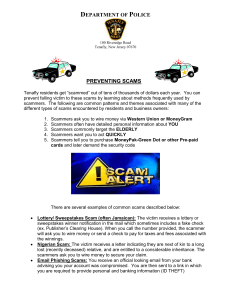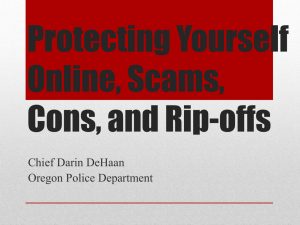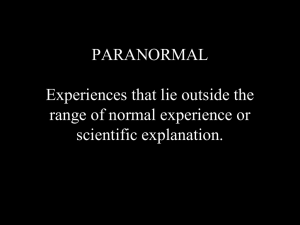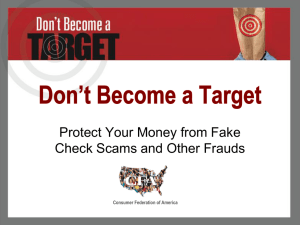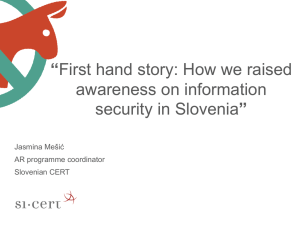The Nigerian Email Scam (Word Document)
advertisement
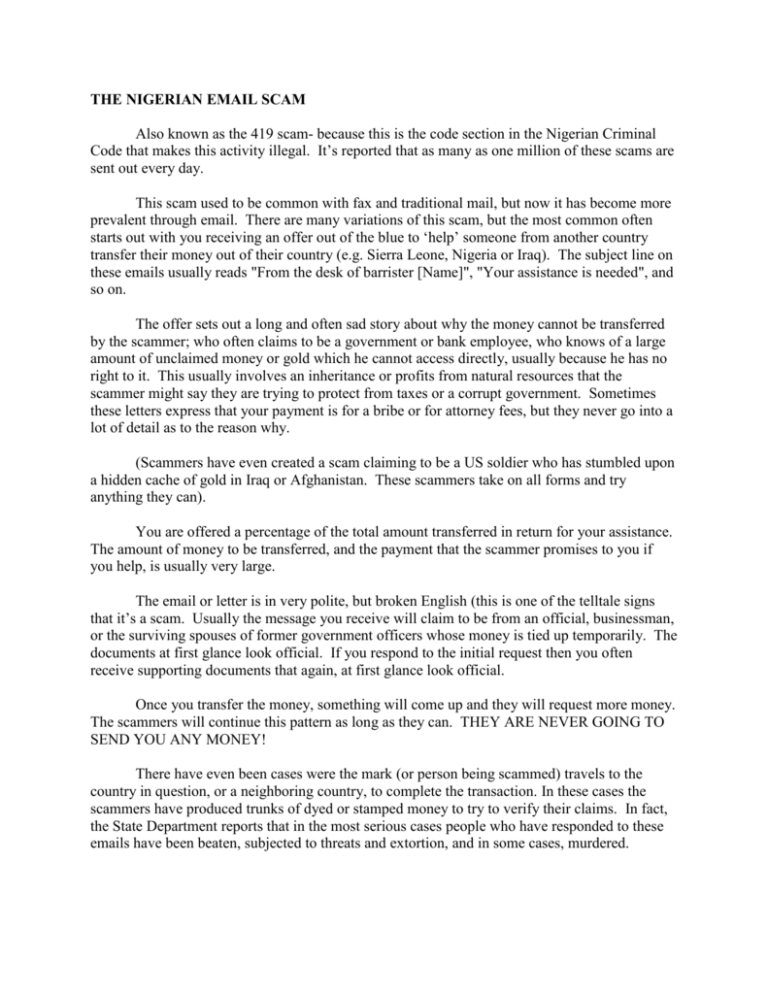
THE NIGERIAN EMAIL SCAM Also known as the 419 scam- because this is the code section in the Nigerian Criminal Code that makes this activity illegal. It’s reported that as many as one million of these scams are sent out every day. This scam used to be common with fax and traditional mail, but now it has become more prevalent through email. There are many variations of this scam, but the most common often starts out with you receiving an offer out of the blue to ‘help’ someone from another country transfer their money out of their country (e.g. Sierra Leone, Nigeria or Iraq). The subject line on these emails usually reads "From the desk of barrister [Name]", "Your assistance is needed", and so on. The offer sets out a long and often sad story about why the money cannot be transferred by the scammer; who often claims to be a government or bank employee, who knows of a large amount of unclaimed money or gold which he cannot access directly, usually because he has no right to it. This usually involves an inheritance or profits from natural resources that the scammer might say they are trying to protect from taxes or a corrupt government. Sometimes these letters express that your payment is for a bribe or for attorney fees, but they never go into a lot of detail as to the reason why. (Scammers have even created a scam claiming to be a US soldier who has stumbled upon a hidden cache of gold in Iraq or Afghanistan. These scammers take on all forms and try anything they can). You are offered a percentage of the total amount transferred in return for your assistance. The amount of money to be transferred, and the payment that the scammer promises to you if you help, is usually very large. The email or letter is in very polite, but broken English (this is one of the telltale signs that it’s a scam. Usually the message you receive will claim to be from an official, businessman, or the surviving spouses of former government officers whose money is tied up temporarily. The documents at first glance look official. If you respond to the initial request then you often receive supporting documents that again, at first glance look official. Once you transfer the money, something will come up and they will request more money. The scammers will continue this pattern as long as they can. THEY ARE NEVER GOING TO SEND YOU ANY MONEY! There have even been cases were the mark (or person being scammed) travels to the country in question, or a neighboring country, to complete the transaction. In these cases the scammers have produced trunks of dyed or stamped money to try to verify their claims. In fact, the State Department reports that in the most serious cases people who have responded to these emails have been beaten, subjected to threats and extortion, and in some cases, murdered. STRANDED TRAVELER SCAM: This scam usually starts with a person hacking or breaking into a person’s email account and sending a message to all the friend’s listed in that person’s address book. This message goes to everyone in the address book and says something like “ Hello, How are you doing? hope all is well with you and family,i am sorry that i didn't inform you about my traveling to England for a Conference.I need your urgent help, I misplaced my wallet on my way to the hotel where my money and credit cards are kept. I urgently need a loan of $3,400 from you to sort-out my hotel bills and get myself back home. I will appreciate whatever you can afford and i'll pay you back as soon as i return. Please help send the money to me via Western Union Money Transfer with my details below Name : Address: Kindly help me to send it soon and let me know the reference numbers (MTCN) with the details of the transfer. Your help will be greatly appreciated. Thanks. There are many variations of this scam: the person is on a business or vacation and they were robbed and they have to settle their hotel bill, get a new passport, or get a new airline ticket, and have to do this while they are waiting for their credit cards to be replaced. The person is always unable to get help from the embassy for some unspecified reason and so on. But, all of these scams contain the same elements- someone claiming to be stuck in a foreign country and asking for money to get back home. These emails are almost always scams- like 99.99%! One of the easiest ways to tell is does the email look like something your friend would send. Pay attention to the grammar and punctuation. Also, look at how they requested the money- sometimes the email says “American Dollars”- do any of your friends talk like this. Lastly, if you still think this email could be real then call the friend that sent it to you. See if they are even out of town- most times they are not. Call friends and neighbors and find out if this person is really in trouble. If you still feel te need to send money then contact your friend by phone directly before you do. Don’t use email because their email account has been hacked. GRANDPARENTS SCAM The "grandparents scam" is one variation of the stranded traveler scam. Except this scam usually occurs over the phone (however, it can occur over email or text). The con artist usually calls and pretends to be a "grandchild" who is traveling abroad and says he or she has been mugged or arrested overseas and please send money. This scam usually sounds like this: “Hi Grandma, do you know who this is?” Grandma usually responds with someone’s name Then the fake grandchild will usually ask for money to solve some unexpected financial problem (overdue rent, payment for car repairs, etc.), to be paid via Western Union or MoneyGram, which don’t always require identification to collect. The fake grandchild then begs and pleads not to tell their parents for fear of punishment. Social media has only fueled this fire, because con artists can use details from people's Facebook pages to make their impersonation convincing. Again, if you receive a call then don’t give out any information. Call the parents if you think this is real. I would rather the child get in trouble then you be scammed out of money! LOTTERY AND SWEEPSTAKES The old saying- “if it looks too good to be true then it probably is” is the best way to describe these scams. These scams all start with you receiving a letter or an email message that claims you’ve already won a foreign lottery or an online sweepstakes. (The First question to stop and ask yourself is: “have you even played a foreign lottery.” If the answer is no then this letter is absolutely a scam. If the answer is yes then you may have bigger issues because it is illegal to play a foreign lottery!) The letter or email often says it’s from a government agency, a bank, a well-known national company, or a company you never heard of, but looks authentic. The letter or email always indicates that the only thing between you and your winnings is the taxes and fees from the lottery. The letter or email then request you wire some money to cover these expenses and then your winnings will be forwarded to you. Some variations on this scam ask for credit numbers or bank account numbers so multiple charges or withdraws can be made. The email message usually reads similar to the following: “This is to inform you of the release of money winnings to you. Your email was randomly selected as the winner and therefore you have been approved for a lump sum payout of $500,000.00. To begin your lottery claim, please contact the processing company selected to process your winnings.” An agency name follows this body of text with a point of contact, phone number, fax number, and an email address. An initial fee ranging from $1,000 to $5,000 is often requested to initiate the process and additional fee requests follow after the process has begun. These emails may also list a United States point of contact and address while also indicating the point of contact at a foreign address.” FAKE CHECK SCAM This scam usually involves you selling something or having a reason for the scammer to send you a check. The scam usually starts out with you getting a response to your ad or online auction posting, offering to pay with a cashier's, personal, or corporate check. Then, as with most of these scams, something comes up at the last minute and the so-called buyer (or the buyer's "agent") comes up with a reason for writing the check for more than the purchase price, and asks you to wire back the difference after you deposit the check. The checks that these scammers send look official and are usually good enough to fool unsuspecting bank tellers. If you deposit the check and then wire money your money is gone. The checks are counterfeit! If you still feel the need to accept such a check and still feel the need to reimburse the scammer then take the check to your local bank and have the teller examine the check for its authenticity. Then wait until the check has clear and the amount has been deposited in your account before you send any money out. Explain the situation to the buyer and if they don’t agree then so what. Better safe than sorry. The best advice to prevent one of these scams is to never accept a check for more than your selling price, no matter how tempting the plea or convincing the story. If the buyer sends the incorrect amount, return the check, and don't send the merchandise. Even better advice is to use an online payment service instead such as PayPal. TECH SUPPORT SCAMS As the world moves towards technology more and more, scammers are focusing on computer hacking. In these types of scams, the scammer usually calls you and tries to get you to give them access to your computer remotely. These scams usually start with the scammer calling you and claiming to be a computer tech associated with a well-known company like Microsoft. The scammer usually says that they’ve detected viruses or other malware on your computer and that they will either sell you some software you don’t need or worse direct you to download a virus or some other software so they can hack your computer remotely. This is always a trick. Be careful because a newer version of this scam has the scammers getting your name and other basic information from public directories and even has them guessing what computer software you’re using. They do this to try to sound more official. No one from Microsoft is going to call you and tell you that your computer has a virus. I have never know Microsoft to call anyone- it’s hard enough to get them on the phone if you call their helpline! Tech scams has been around for years, but as society relies on computers more and more, scammers spend more time developing these scams. Scammers will often set up fake websites, offer free “security” scans, and send alarming messages to try to convince you that your computer is infected. These are all designed so that you will think you have a problem and the scammer can try to sell you software to fix the nonexistent problem. At best, the software is worthless or available elsewhere for free. At worst, it could be malware — software designed to give criminals access to your computer and your personal information. If you get a call from someone who claims to be a tech support person, hang up and call the company yourself on a phone number you know to be genuine. A caller who creates a sense of urgency or uses high-pressure tactics is probably a scam artist. PHONEY FRAUD ALERTS A phoney fraud alert is a type of scam known as a phishing scam (to try to obtain financial or other confidential information from Internet users, typically by sending an e-mail that looks as if it is from a legitimate organization, usually a financial institution, but contains a link to a fake Web site that replicates the real one). These phoney fraud alert scams can be in the form of an email or a phone call claiming to be from your bank or financial institution (more recently I have seen letters that are mailed that actually look like it’s from a reputable company and then telling you to call a number and then they get you to give them your information). You could be told that a suspicious transaction has recently occurred on your account, perhaps a large purchase in a foreign country. You would then be told that if you did not authorize the transaction, you need to take immediate action as your credit card details have been stolen. The scammer will ask you to confirm your credit card or account details so the ‘bank’ can ‘investigate’. If you receive an email, it may ask you to visit a website to confirm your credit card details or to find out more information on the supposed ‘fraud’ to your account. In some variations of this scam, the scammer may already have your credit card number (that they have stolen previously), and may even quote this to you. They will then ask you to confirm that you are the cardholder by telling them the 3 or 4 digit security number printed on the card. If the scammers have this number, they can use your card to buy things over the internet or phone. These phoney fraud investigations are used to steal your banking details so the scammers can use your account. They work by lowering your guard with the phoney fraud alert. They hope that you panic and do what they suggest to fix the ‘problem’. They are particularly tricky to spot because real banks and credit unions often do contact people if there has been suspicious activity on their account. A legitimate bank or financial institution will NEVER email you asking you to follow a link or asking you for personal details. If you believe the email is genuine, telephone your bank or financial institution to let them know about the email and ask their advice. Do NOT call using any telephone number listed in the email— use a number that appears on your statement or card, or in the phone book. Many banks and financial institutions now have specialized internet security staff who can help you. You should NEVER give out your personal or bank account details to somebody you don’t know and trust. Don’t be tricked by an email that looks legitimate or appears to link to a genuine website. The best defense is to delete the email before you even open it and then contact your bank. Example: Dear Citibank Member, This email was sent by the Citibank server to verify your e-mail address. You must complete this process by clicking on the link below and entering in the small window your Citibank ATM/Debit Card number and PIN that you use on ATM. This is done for your protection - because some of our members no longer have access to their email addresses and we must verify it. To verify your e-mail address and access your bank account, click on the link below. If nothing happens when you click on the link (or if you use AOL), copy and paste the link into the address bar of your web browser. [LINK REMOVED] --------------------------------------------Thank you for using Citibank! --------------------------------------------- SECRETE SHOPPER SCAMS Email received that says: We have a mystery shopping assignment in your area and we would like you to participate". Actually refers to Secret Shopper®. An Actual Company Ends with: Kindly Fill Out the application form below and we will get back to you shortly with the assignment: PERSONAL INFORMATION: First Name: Middle Name: Last Name: Street Address: City, State, Zip Code: Cell Phone Number: Home Phone Number: Age: Current Occupation: Email Address: We await your urgent response. Thank you your willingness to work with us. We look forward to working with you. Sincerely, Brad Hudson. Secret Shopper® Sample email: Hello, I am Brad Hudson, Recruitment Specialist with Sights On Service Inc. “We have a mystery shopping assignment in your area and we would like you to participate". Secret Shopper® has been in business since 1990. We are a charter member of the Mystery Shopping Provider's Association (MSPA), the professional trade association for the Mystery Shopping industry. There is no charge to apply to be a Secret Shopper® and information is protected. Secret Shopper® is accepting applications for qualified individuals to become mystery shoppers. Its fun and rewarding, and you choose when and where you want to shop. You are never obligated to accept an assignment. There is no charge to become a shopper and you do not need previous experience. After you sign up, you will have access to training materials via e-mail, fax or postal mail. ABOUT US Secret Shopper® is the premier mystery shopping company serving clients across America and Canada with over 500,000 shoppers available and ready to help businesses better serve their customers. Continual investment in the latest internet and communication technologies coupled with over 16 years of know-how means working with Secret Shopper® is a satisfying and rewarding experience. Secret shopping as seen on ABC NEWS, NBC NEWS, L.A.TIMES. Since 1990, Secret Shopper® has delivered actionable intelligence to our clients, helping to drive exceptional bottom-line performance. Nearly 1,000 shoppers have registered this week, performing millions of mystery shops throughout North America and the Caribbean. When coupled with our continual investment in the latest internet and communication technologies, you can rest assured that working with Secret Shopper® is a satisfying and rewarding experience. Secret Shopper® is also a charter member of the industry trade association, the Mystery Shopping Providers Association (MSPA). Benefit from partnering with America’s premier mystery shopping company. We have been building our tradition of excellence for two decades. Stores and organizations such as The Gap, Walmart, Pizza Hut and Banks. One amongst many others pay for Secret Shoppers to shop in their establishments and report their experiences. On top of being paid for shopping you are also allowed to keep purchases for free. Secret Shopper® NEVER charge fees to the shopper. Training, tips for improvement, and shopping opportunities are provided free to registered shoppers. Mystery shoppers are either paid a pre-arranged fee for a particular shop, a reimbursement for a purchase or a combination of both. Secret Shopper® has available for immediate assignment an inspection of the customer service of any walmart in your area. You are to shop secretly. This fee will be paid upfront. During this shopping, you will visit a location and make several observations as regards the customer service. You will be required to interact with the shopper clerk. You may conduct the shop alone or as a couple. The assignment will pay $350.00 per duty and you can be able to get up to 2- 3 duties in a week depending on how fast you are able to execute the first assignment. Kindly Fill Out the application form below and we will get back to you shortly with the assignment: PERSONAL INFORMATION: First Name: Middle Name: Last Name: Street Address: City, State, Zip Code: Cell Phone Number: Home Phone Number: Age: Current Occupation: Email Address: We await your urgent response. Thank you your willingness to work with us. We look forward to working with you. Sincerely, Brad Hudson. Secret Shopper® Quick Google Search of “Brad Hudson Secret Shopper®” reveals that this is a scam. In fact, the top 5 results are for websites describing the scam and warning people not to fall for it. Another way to check the validity of this email is to review the sender’s email address. It says it’s from Brad Hudson, but when you highlight the address to reveal the full address it shows that it is actually sent from Lisa4socr@aol.com. This is a clear sign that it’s a scam. EMAIL PHISHING SCAMS Example: Subject: Your Yahoo Account Has Exceeded.. Dear Customer, Your E-mail account has exceeded its limit and needs to be verified, if not verified within 24 hours, we shall suspend your account. Click Here Thanks. Another example of one of these phishing scams is: Dear account holder, This message is for users of Bellsouth.Net message center for Bellsouth.Net all account owners Webmail. We Currently, the improvement of our web / database and perform the maintenance of all our e-mail accounts in order to reduce the rate of spam emails. It is also the elimination of all Unused Bellsouth.Net E-mail account to create more space for new accounts. To ensure that your account is closed unnecessarily, it will have to updated with the following information then to know that this is a gift and is used in also facilitate the maintenance operation. Confirm your identity below email 1.Full E-mail........................ 2.password ......................... 3.Phone Number....................... 4. Your Number........................ 5.First Name ........................ Warning code: VX2G99AAJ Attention! Account holder who refuses to update your account within seven days of receiving this warning will lose your account permanently. Thank you for using Bellsouth.Net Webmail! These message are not from who they say they are from. These scams are fishing (phishing) expeditions and are try to get you to give the scammers your email login and password. If you click on the link on these emails then you will be taken to a fake webpage and asked to login and then may be asked to give more personal or financial information. These websites are designed to look authentic. Once you have "Signed in" on the fake site, the scammers have what they need and they can now use your account for any purpose they wantusually further criminal activity. Often, these criminals use the hijacked accounts to launch further scams and spam campaigns. One such scam is the one described above about pretending to be a friend and requesting money. Once the scammer have access to your account, they will then send emails to all of the people on the account's contact list. These emails will falsely claim that the account holder is in a very difficult situation and desperately needs financial assistance. If you receive one of these phishing scam messages, do not click on any links or open any attachments that it may contain. GEORGIA POWER SCAM A newer scam has recently surfaced regarding scammers pretending to be Georgia Power. These most recent scams involve billing scams and prepaid debit cards. Georgia Power reports that both residential and business customers are targeted in these scams. These scams usually start out with the customer receiving a call that their account is late or past due and that because of this, their electricity will be cut off. Unless, the customer purchases a prepaid debit card and provides the caller (the scammer pretending to be Georgia Power) with the card’s account number. These scams also involve the caller ((the scammer pretending to be Georgia Power) demanding that customers give a credit card or debit number over the phone. Georgia Power has released an official statement that this is the first sign that this call is a scam. “We don’t call our customers and ask them to make a payment,” Customers get a prerecorded message on the primary number the utility has on file, asking them to contact the utility to discuss their account. Georgia Power has also received reports of scammers coming to their homes and businesses pretending to be employees of Georgia Power and trying to collect money. Georgia Power has said that they do not send staffers out to customers’ homes or businesses to collect payments. The only utility workers who make visits are technicians in Georgia Power uniforms with IDs, the utility said. TIPS TO AVOID BECOMING A VICTIM OF ONE OF THESE SCAMS: If it’s too good to be true then it usually isIf you didn’t play the lottery then you didn’t win If someone wants money then investigate further If someone wants your personal information then investigate further If it sounds fishy then don’t do it. Follow up on your own. No Company is going to penalize you further for contacting them directly to make a payment. If your concerned then end the conversation and find the number for the company on your own (one that you know is authentic) and then call them directly. If you want tech support, look for a company’s contact information on their software package or on your receipt. Never give your password on the phone. No legitimate organization calls you and asks for your password. Put your phone number on the National Do Not Call Registry, and then report illegal sales calls. NEVER send money, or give credit card or online account details to anyone you do not know and trust. Do not open suspicious or unsolicited emails (spam): delete them. IF YOU ARE A VICTIM OR YOUR IDENTITY IS STOLEN Report the crime- contact your local police, the FBI, and any other authorities that have units to investigate these scams. Your money is probably gone. But, maybe you can help someone else not to become a victim Become knowledgeable on the subject and don’t fall victim to another scam. Once you become a scammer’s victim all the other scammers flock to you. If your identity is stolen or it’s an ongoing scam then contact your financial institutions and let them know what’s going on. Contact the fraud departments of any one of the three major credit bureaus: Equifax, Experian, and Transunion. Report ID Fraud to the Credit Bureaus: Equifax P.O. Box 105069, Atlanta, GA 30348 Report fraud: Call 1-800-525-6285 or write to address above. Order credit report: 1-800-685-1111 www.equifax.com Experian (formerly TRW) P.O. Box 9532, Allen, TX 75013 Report fraud: Call 1-888-397-3742 or write to address above. Order credit report: 1-888-397-3742 www.experian.com TransUnion P.O. Box 6790, Fullerton, CA 92834 Report fraud: Call 1-800-680-7289 or write to address above. Order credit report: 1-800-888-4213 www.transunion.com Resources: FTC ID Theft Resources http://www.ftc.gov/bcp/edu/ microsites/idtheft2012/ US Department of Justice http://www.justice.gov/criminal/fraud/websites/idtheft.html File a Complaint: FTC Complaint Form https://www.ftccomplaintassistant.gov/ Postal Inspection Services If you suspect someone has been tampering with your mail in any way, go this address for instructions on steps to take: https://postalinspectors.uspis.gov/ forms/IDTheft.aspx Do you suspect that your Social Security number is being used fraudulently? Contact the Office of the Inspector General at: http://oig.ssa.gov/report-fraud-waste-or-abuse If you suspect your identification is being used improperly in connection with tax violations, please visit the following site for more information: http://www.irs.gov/uac/Identity-Protection http://www.consumer.ftc.gov/topics/privacy-identity http://consumer.georgia.gov/consumer-topics/identity-theft-instructions-for-victims Sources http://www.onguardonline.gov/articles/0002l-nigerian-email-scam http://www.ic3.gov/crimeschemes.aspx http://www.scamwatch.gov.au/content/index.phtml/tag/PhoneyFraudAlerts Sample letters- http://netforbeginners.about.com/od/scamsandidentitytheft/ig/Phishing-Scamsand-Email-Cons/ http://www.bankersonline.com/security/phish_scam_email.html
